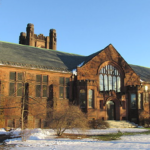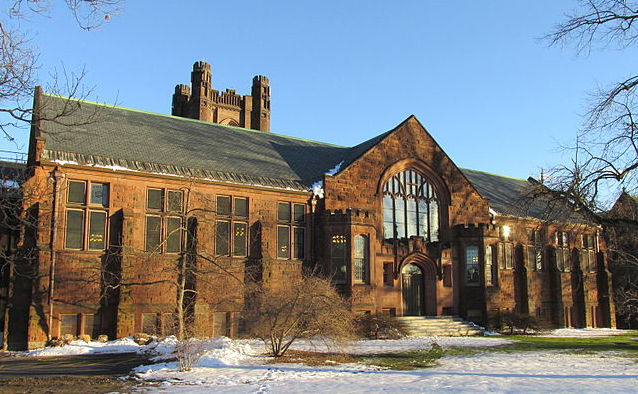Today’s guest post is from Perry L. Glanzer, professor of educational foundations at Baylor University, and resident scholar with Baylor’s Institute for Studies of Religion.
The greatest human evils and body counts of the past century—the Russian Gulags, the Holocaust, the Holodomor (the human-made Ukrainian Famine), the Chinese Cultural Revolution, the Armenian Genocide, the Cambodian Killing Fields, and the Rwandan Genocide—all share the same three ingredients: (1) concentrated state power; (2) an enraged mob (usually the majority) motivated by comprehensive secular ideology and/or tribal loyalties; and (3) a passive and seemingly helpless population, including the victims. As Rene Girard helpfully reminds us, the victims often serve as scapegoats for the enraged mob, so the mob can avoid confronting the deeper moral rot within their whole society.
In his invaluable new book, Live Not By Lies, Rod Dreher warns Christians that certain forms of these ingredients are now present and growing in the United States. Although he does not expect anything like state-sponsored genocide, he contends we must be ready for what he calls soft totalitarianism. Hard totalitarianism occurs when the state seeks total control of defining truth, including your actions, your thoughts, and your emotions. In contrast, soft totalitarianism occurs when elites who control public opinion also control permissible actions and speech. He divides this argument into two parts. In the first, he makes his case for why America is inching toward soft totalitarianism. In the second, he provides Christians with suggestions for surviving the coming soft totalitarianism, based on interviews with Soviet dissidents.
Dreher makes his case in the first part of his book by pointing out that Hannah Arendt’s description of a pre-totalitarian society accurately describes America today. We share: (1) loneliness and social atomization; (2) a lost faith in hierarchies and institutions; (3) the growing desire to transgress and destroy; (4) an increase in propaganda and the willingness to believe useful lies; (5) a mania for ideology; and (the one I often see in American higher education); (6) a society that values loyalty more than expertise. Dreher draws upon observations of post-communist immigrants who saw them under communism and now see these characteristics emerging in America. Despite this evidence, in making this comparison between Soviet totalitarianism and the United States, Trevin Wax’s TGC review suggests that Dreher “overplays his hand.” Actually, I think he underplays it.
Dreher does not mention one of the most important ingredients that would allow American elites to turn soft totalitarianism into hard totalitarianism—the increasing concentration of political power in American life. Consider that before World War I, we had no federal income tax; Supreme Court decisions did not generally apply to the states; the federal government had no role in education; the vast majority of college students attended private colleges and universities; entities such as the FBI, CIA, and the Department of Homeland Security did not exist; federal regulatory agencies were almost nonexistent; and our military was miniscule. These things made us very different from the monarchies across the Atlantic Ocean, including Russia. All those things have now changed, to make us more like the former USSR. Today, one letter from one federal bureaucrat, or one decision with a one-person Supreme Court majority, can radically alter the price of faithfulness for Christians in education, business, or health care. As Ross Douthat recently noted after the death of Justice Ginsburg, “A system in which the great questions of our country are settled by the deaths of octogenarians is too close to late-Soviet Politburo politics for comfort.” Structurally, we are more like authoritarian and totalitarian governments than ever before.
Americans tend to be naïve about this concentration of federal power, since most do not recognize this historical change. The elites who do recognize it believe they have largely been a force for good. After all, the expansion of federal government power has helped us address great ills such as poverty (e.g., Social Security and Great Society programs), racial injustice (e.g., civil-rights laws and court decisions), health problems (e.g., Obamacare), the rights of minorities (with the Bill of Rights applied to the states), educational inequities (e.g., federal loans), educational advances (e.g., the mass growth of higher education) and more.
Of course, concentrated power does help get certain good things accomplished, but we cannot be blind to the possible future costs. This is where Trevin Wax is wrong. The potential increasingly exists for secret police (for the first time, we have what Czarist Russia had for centuries—a national internal police that watch citizens), strict censorship (ask most professors how they feel about their free speech these days), deprivation from jobs (ask people fired for posting and saying the “unwoke” thing), and more. An increasingly nationalized and centralized education system also makes it easier for governments to “reeducate” millions. Just ask the Chinese Uyghurs.
We also have newly woke revolutionaries to support the elites. I recently had a student defend communism on the basis that Lenin and Stalin did advance literacy and extend the life span of the Russian people. In response I seriously joked, “I guess those life span stats did not include the life spans of the tens of millions of deaths directly attributable to Lenin and Stalin in the Gulags or the Holodor.”
Admittedly, I needed little convincing in this first section. Like Dreher, a book project on moral education in Russia led me to spend a significant part of my career reading about Soviet life, living and traveling in post-communist Russia and Europe, and interviewing post-communists in Russia, Ukraine, and Eastern Europe about their moral and spiritual lives. Through these interviews and the relationships, I encountered the same fiendish effects of communist totalitarianism and the trauma faced by dissidents.
The Trump presidency seems to have awakened some Americans to the dangers of having malign officials using this enormous and continually expanding state power for nefarious ends. However, rather than creating new and strengthening old safeguards (e.g., making Congress actually matter) against the abuse of centralized state power (the answer of early American political architects), most think the solution is simply to have the right people in the power centers (especially the executive branch and Supreme Court). These odd optimists remind me of friends who believe in total depravity, but for some reason are quite confident about what “the right people” with concentrated state power can accomplish for the common good or the Christian cause. Based on my experience studying and talking to people in totalitarian regimes, I tend not to share this optimism. My view is also colored by the fact that countries such as Austria, Romania, and Ukraine persecuted my own ancestors for their Anabaptist beliefs.
This last point, however, brings up one key reason for optimism that both Dreher and Wax overlook. One of the reasons state authorities expelled my ancestors from these countries was that the established churches (Catholic and Eastern Orthodox) were part of the state’s elite culture, cozying up to state power and encouraging the state to do their dirty monopoly-maintaining work. Neither Anabaptists/Baptists nor the freedom to evangelize has fared well in countries where Eastern Orthodox Christians are the majority. In fact, the Eastern Orthodox Church has a history of asking the state to squash dissent and religious liberty (e.g., Russia, Greece).
The church monopoly institutionalized through state partnership helped Soviet totalitarianism emerge more quickly. The Soviets easily took over education because state authorities already had a habit of using Russian Orthodoxy to buttress state educational institutions and, as a result, the Orthodox Church never started their own private universities. Whether conservative or liberal theologically, centralized state governments love using the church for their ends. Thus, the only Christian university that existed in communist lands after World War II was a private Catholic Polish university (Pope John Paul II’s alma mater and now namesake).
Here is where the United States does have an advantage that should give us hope (sociologically and politically speaking; theologically speaking, our hope comes only from God). America’s tradition of religious freedom and disestablishment has meant that we have fashioned space for religious creativity in all areas of life. A diverse array of religious traditions have built educational institutions, hospitals, charities, parachurch groups, and more. Fifteen percent of our population still attends private K-12 educational institutions or is homeschooled, and 22 percent still attend private colleges. Despite recent travails, we have the most diverse and robust system of Christian higher education in the world. The diversity of this system can help stem the tide of totalitarianism. Unsurprisingly, one of the first things Hugo Chavez did to enforce totalitarian rule in Venezuela was to outlaw private education.
What could our churches, private Christian schools, private Christian colleges and universities, private parachurch groups, private Christian charities, and so on, teach Christians in the face of concentrated state power? Here is where Dreher’s book shines. He distills some of the most vital lessons from dissidents under communism. He sets forth six of them.
Value Nothing More than the Truth
First, we need to value nothing more than truth. As Ephesians 6 says, buckle the belt of truth around your waist. Dreher also helpfully reminds us of a couple reasons we accept lies. We desperately want to preserve our own comfort and survival. Such a person, Dreher reminds us (quoting Havel) is “a demoralized person.” I would merely add one more thing. At universities, I find that students, staff, and faculty also tend to accept lies to make other people emotionally comfortable. In their mind, this makes accepting lies morally justifiable, since it is showing hospitality to the stranger. As I remind my students, we often use such misunderstandings of virtue to excuse our moral failings.
Cultivate a Cultural Memory
Second, Dreher advocates cultivating cultural memory. He tells the story of a 26-year-old Californian Communist who had never heard about the gulags. I remember interviewing leaders at the Ukrainian Catholic University in 2007 who shared how their students did not know anything about Lenin or Stalin. To help “jog their memory,” they asked every student to interview survivors of the underground Catholic Church that the communists outlawed in Ukraine (communists did not outlaw the Eastern Orthodox Church in Ukraine but did control it). Every student learned how to cultivate memory and the institution collected all the memories. We can learn from them. Only now is my own city and university collecting those memories of a loathsome lynching that occurred in 1916.
See Families as Cells of Resistance
Third, Dreher maintains that families must become resistance cells. He tells the heroic story of the Benda family in the Czech Republic and how these isolated Christian academics raised a family of six children to be faithful Catholics in the midst tremendous ideological pressure. The moral pedagogy of the parents is a model for all parents. They had the children watch High Noon to understand how to develop courage against the larger communist society. They read to the children two to three hours a day. A favorite was The Lord of the Rings, because “we knew Mordor was real. We felt that their story . . . was our story.” They dressed their kids differently, so they learned how to be different and showed them they were accountable to God and not humans. They asked their children to participate in their dangerous advocacy for human rights, since they wanted their children to know that they were engaged in a “fellowship” struggling for the cause of justice. Every parent should read this chapter of Dreher’s book.
Rely on Christ, the Solid Rock
Fourth, you have to rely upon Christ, the solid rock of one’s faith. As one former prisoner shared, “You can’t simply be against everything bad. You have to be for something good. Otherwise, you can get really dark and crazy.” Totalitarians are masters of fueling bitterness and resentment among various interest groups on the basis of past and present injustices. In contrast, Dreher shares about dissidents such as Silvester Krčméry, who survived prison by giving himself totally to what Ephesians describes as the shield of faith (“the more I depended upon faith the stronger I became”) and the sword of the Spirit, the Word of God (“Memorizing texts from the New Testament proved to be an excellent preparation for critical times and imprisonment”).
Resist Evil through Communal Prayer
Fifth, Dreher advises that we need to engage in the work of resistance to evil with a small, praying community (a la Eph. 6:18-20). You pray together for the courage to resist, and as one Christian recounts, “When you were with your friends in these communities, you had freedom.” Not surprisingly, our recent Baylor Character and Spirituality Study of students found that the key to their spiritual and moral flourishing in college was involvement in Christian small groups. Although a staple of evangelical circles, Catholics and the Eastern Orthodox could learn from this insight. As my Russian friends would often tell me: if I want to pray, I go to the Orthodox Church, but if I want to understand something, talk to other believers, and experience fellowship, I go to Protestant small groups.
Resist the idolatry of Comfort
Finally, as any good Eastern Orthodox Christian will do, Dreher reminds us in the end that to live for Christ involves suffering under either soft or hard totalitarianism. It is a timely lesson he illustrates with powerful examples. In the Baylor Character and Spirituality Study I mentioned, when we asked Baylor students what the good life looks like to them 10 years from now, what they describe is the opposite of suffering. They do not want riches; they merely want one of the most dangerous idols of them all, “to be comfortable.” As Father Kirill Kaleda says in Dreher’s book, “this current ideology of comfort is anti-Christian in its very essence.”
We will increasingly be tempted to deny bits of Christian theology and ethics to keep our level of comfort. God save us and help us stand against that spreading evil. Dreher’s book will help us do that.
Some book links provided here are part of the Amazon Services LLC Associates Program, an affiliate advertising program designed to provide a means for sites to earn advertising fees by advertising and linking to Amazon.com.

















